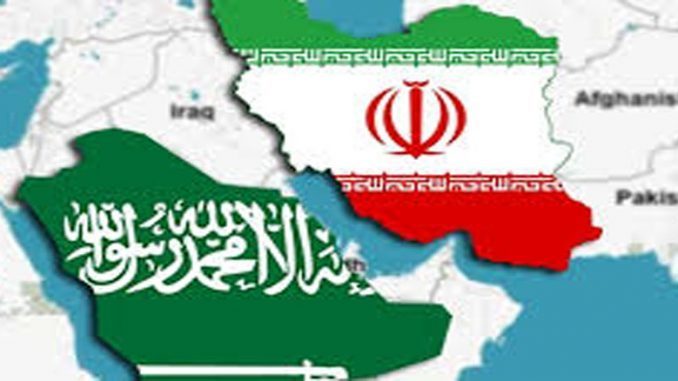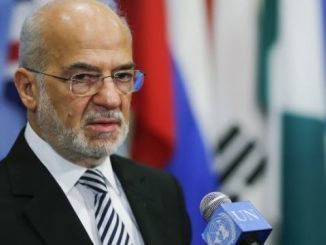
 BY: İbrahim Karagül*
BY: İbrahim Karagül*
Missile attack before Erdoğan’s visitThe threat was greater than thought. Even the conservative circles closely watching the region were far from seeing this fatal truth. Determining position based on the Shiite-Sunni or Iran-Saudi Arabia showdown was another factor preventing us from seeing the dire truth.
I wanted to draw attention to this matter once more before President Recep Tayyip Erdoğan’s visits to Bahrain, Saudi Arabia and Qatar, which will begin on Feb. 12. A ballistic missile fired from Yemen reaching a military base near Saudi capital Riyadh right before the visit should be enough to warn us about the greater danger that is in store after the Syrian war. In November 2016, another ballistic missile targeting Jeddah was fired from Yemen, but was downed 65 kilometers before reaching Mecca skies.
Iran will wage war further away from its borders
The civil war in Yemen is an Iranian-Saudi war. The Houthis are not only acting as an organization, they are also attacking Saudi Arabia with the ballistic missiles developed and supplied to them by Iran. According to Houthi statements, these are only trials and much bigger missile attacks are going to start.
Don’t be fooled by the chants of “Allahu akbar” (God is the greatest) and “Death to America” slogans after the attacks. The Houthis’ and Iran’s target is not the U.S.; there is only Saudi Arabia and the Gulf countries that support it. If Tehran is going to target the U.S., it will not do it through the Houthis and from the shore of the Red Sea – it would have targeted the U.S. military force in the Persian Gulf.
Because Iran has always moved the crises far from its borders, breaking out wars far from its own territory; it has never chosen to get into a showdown on Iran’s border. This is the right strategy and it is also smart. The clash with Israel through Hezbollah, establishing a base on the shore of the Red Sea through the Houthis and sieging Saudi Arabia from the south, showdown in Syria through Bashar Assad and the Nusayris in Syria, forming influential power in Afghanistan and Pakistan through the Shiite groups in these countries and gaining control over Iraq through the Shiites in this county, are all Iran’s projects.
It’s still marketing ‘revolution’
If it hits Saudi Arabia from the Persian Gulf, it is likely the war will spread to its own territory. Thus it has always waged war in others’ lands and sacrificed these countries and communities for its own future.
Unfortunately all the conflicts in the region are being marketed through religious identity, sectarian identity and political discourses that are formed within that context. While the absurdity of Tehran continuing to market “revolution” from this point onward is obvious, while its regional war has no religious aspect, its ability to market even this project through religious and sectarian identity is a talent specific to Iranian politics.
It is going to hit the Persian Gulf and Saudi Arabia
I had said, “As soon as the Syrian war ends, the Persian Gulf is going to become destabilized,” and I still stand by what I said. Saudi Arabia and Gulf countries are directly going to become Iran’s targets. Because up until today, Tehran used to hang around its “main target.” Syria was the biggest conflict area for the time being, because it was reaching the shores of the Mediterranean from here. Hezbollah alone was not enough, however it was still Tehran’s door opening to the Mediterranean. A change of rule in Syria meant that Tehran would no longer have a hand in the Mediterranean.
Remember that the Arab-Persian border was the Iraq-Iran border until the 1991 Gulf War. After the 2003 invasion, Iran had taken control over Iraq. The Arab-Persian border shifted to Syria. If Iran gains full control over Syria too, there will be no Arab influence left all the way to the Mediterranean and the Arab world is going to be heavily besieged.
Iran and Iraq can re-invade Kuwait
In such circumstances, Iran will have Saudi Arabia under siege from the north, west, south (from Yemen) and east. This is what will form the ultimate front of the Arab-Persian war. All countries from Kuwait to Qatar, Bahrain to Saudi Arabia are under threat. The invasion of Kuwait during the Saddam Hussein period had prepared the end of Iraq. The possibility that Iran-controlled Iraq might attempt to re-invade Kuwait during such a period should not be ignored.
After the Cold War, the Islamic geography was targeted by a major outside invasion project and this period is ongoing. Countries were invaded, civil wars were waged and new maps were drawn. Once every few years, a country is forced to a similar fate.
Nuclear deal: Tehran cheated
The traumas Turkey has been experiencing in the last four years need to be evaluated a little in this context too. Whether it is the Kurdistan Workers’ Party (PKK) or the Fetullah Terrorist Organization (FETÖ), the identity and nature of the organizations no longer have any significance; they have all been activated against Turkey in the context of a big project. The aim is to stop the great walk Turkey has been continuing for the last decade, to take over it and condemn it to new map projects. In this sense, Turkey is giving its greatest struggle since World War I.
It is in such a period that we need to approach and look at the region differently for Turkey as well. All that is happening in the Middle East today are more complex and more difficult than the World War I period. The Syrian war has, in this aspect, opened Turkey’s eyes. Turkey, which has been defending Iran’s nuclear theories together with Brazil, despite the world’s center powers, has paid the heavy cost of this both through the attacks from the West and the betrayal of Iran.
This is the Turkey ‘should not be super power’ war
Tehran, also fought in Syria against Turkey’s plans to become super power; it established partnership with the PKK’s Syrian offshoot, the Democratic Union Party (PYD) and attempted to close in on Turkey from the south, tried to close Turkey’s doors opening to the south and end its ties with the Arab world.
Those closing the gateways between Turkey and Central Asia have also tried to close the borders between Turkey and the Arab world by building walls and turning them in to fronts. However, Iran did not and will not hit Turkey directly. It is again trying to push Ankara into a corner through proxy wars and implementing a siege plan similar to the one on Saudi Arabia.
Plan to wipe out Saudi Arabia from the map, not Israel
The second storm of invasion and chaos other than the global invasion targeting the region is these geopolitical plans by Iran, its imperial ambitions. This is hitting from the inside. Saudi Arabia is at the defense under every circumstance, Iran is in the attack position. The era in which this aggressiveness was marketed through anti-Israel and anti-American sentiment is over. The “wiping out Israel from the map” discourse is overt and propaganda, the “wiping our Saudi Arabia from the map” plan is covert and real. The masses need to be warned in this regard and this threat targeting the entire region must to be prevented.
In saying this, we are not pointing to a Shiite-Sunni tension, to a war with Iran. Because this would be destruction. Peoples and masses are only the victims of these destructive plans by Iran. We need to seek ways to get them to bond rather than make them enemies. Yet, it is time to push Iran’s areas of weakness to stop the Persian invasion map. If Tehran’s political elites do not put an end to this craziness, it will be revealed that Iran’s weakest link is in its midst. It is because they are aware of this that they insist on carrying the war much beyond their borders and prevent it from reflecting inside the country.
Will Trump target Iran?
U.S. President Donald Trump’s arrival has signaled change in the U.S.’s regional policies. After former U.S. President Barack Obama’s pro-Iran, anti-Turkey, terror fan policies, the Republicans are giving indications of returning to the “enemy Iran” theory again. We will see where this policy will end up and what will happen to U.S.-Iran ties. It seems as though the first area of showdown is going to be Yemen. Perhaps this is why Iran is trying to threaten with the missile attacks.
But whatever happens, Iran is the one that has had the upper hand in all U.S. interventions since 1991. Tehran has never had showdown plans with a power outside the region. All of its wars are aimed inside the region and they will continue to be that way.
If a stray missile falls into Mecca
I am seriously concerned that the siege and attacks targeting the Persian Gulf and Saudi Arabia will, within a couple years, turn into a ball of fire, the fires will surround the entire region and it will go as far as “Mecca Wars.” I will also add that this is much beyond a “concern.”
The missile headed for Jeddah over Mecca was hit in the sky. Recently, one of the same missiles targeted the Saudi capital, Riyadh. In other words, they showed they can hit anywhere, anytime they desire. What will happen if one of those missiles fall into Mecca? What kind of a disaster can a stray missile lead to? What if in the meantime someone hits Mecca with a pirate missile, what if someone sets a plot, what kind of hell will break lose?
Is this possible? Sure is!
*Ibrahim Karagül is a Turkish writer and journalist. He is the editor-in-chief of Turkish Yeni Şafak newspaper.
(Published in Yeni Şafak Turkish newspaper on Thursday, Feb. 8, 2017)



